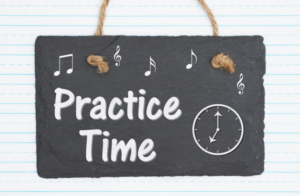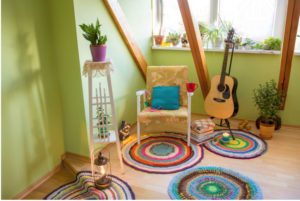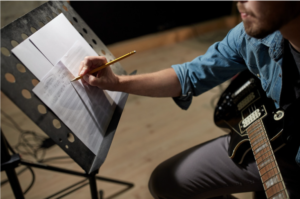How To Develop Good Practice Habits For Quicker Results

In this lesson, we are going to look at how to develop good practice habits for quicker results. This and this alone is what is going to determine if you reach your desired outcome, or if you quit before you get there.
Learning to play guitar is not always easy. You’ll discover some concepts and techniques will be harder to comprehend than others. There will be times when you get frustrated and feel that you’re not progressing as quickly as possible.
The reason for this is because of the wide variety of approaches you can take to playing the instrument. By knowing how to develop good practice habits, you’ll be able to progress your learning faster and ultimately progress your playing quicker.
So let’s take a look at some tips that can help you to develop good practice habits for quicker results. This way you will not only create a non-stop flight to where you want to go but also have fun in the process.
Practice Time-when to practice
It is always best to start in very small increments of time. This will allow your muscles to develop. Muscles in the hands, wrists, and fingers need to be developed.
This can only be done through time. With proper practice habits, this can be accomplished which will allow you to progress more rapidly.
Start with 10 to 15 minutes, then proceed to 30 minutes, 45 minutes, and so on and so on. This will accomplish two things. Develop your muscles consistently, and develop retaining the information you are learning on a day-to-day basis.
One of the most common mistakes that people make with learning guitar is that they practice for an hour or two for one day and then don’t practice for two or three days. Don’t make this mistake!
Practice Space-where to practice
Have a specific space to practice in. This could be an extra bedroom, basement, or garage. It doesn’t matter where it is as long as it’s a place that makes you want to pick up your guitar and learn how to play it. A place where you can play what you have already learned.
Having a place to practice is helpful because when you sit down to learn, your mind gets focused and you concentrate better. With the proper environment, you will see that you progress much faster and more easily.
Practice Daily-learn faster
You’ll progress faster if you practice a little every day and retain the information. You’ll notice your progress, start having fun, and will feel motivated to keep going. Practice what you’ve learned, and work on learning new things.
Another common mistake is for students to only practice what they are already good at. This is fun and all but progress in learning is stopped. Don’t make this mistake either!
It’s best to review what you’re good at, continue to work on things that you’re not so you can get better, and work on putting it all together in an application.
Know Your Notes and Chords
Get to know how all the notes work to form chords and scales. How songs are constructed. Why does putting together some things work, and putting together some things don’t?
This is a bit more advanced if you’re just starting, but be sure to retain your fundamentals at all times. What string are you playing on? What chord are you playing?
Major or minor What type of chord is it? What notes are in the chord? What is the best way to apply the chord in context? These are all questions you should know the answer to.
Practice Routine-what to practice
Practicing guitar should be much like working out in exercise. Knowing how to develop good practice habits allows you to plan out what you are going to work on and work on each thing for a specific amount of time.
Example: Basic chords (5 minutes) Finger exercises (5 minutes) Songs you already know (10-15 minutes) Knowing your notes (5-10 minutes) new songs you’re currently learning (10-15 minutes) and any scales you might know.
Practicing just these few things that have been mentioned above will allow you to put in plenty of time to continue getting better daily.
If you have something specific that you want to accomplish (a specific song perhaps) then work on that for the duration of time.
The main point here is that you practice consistently. Do this and you will see good results in your playing.
Practice Habits Conclusion
If you get focused, set goals, and practice a little bit daily, you will see clearly and quickly why this is important and continue to do so. Work on getting a clear tone when forming chords.
Playing scales, and developing your signature sound. Follow these examples, learn how to develop good practice habits and you will progress forward faster. If you have any questions please feel free to contact me and I will guide you in the right direction.
In addition to all this, make sure you are well-focused on your goal of why you want to learn the guitar and the result that you are shooting for. If help is needed in this area, be sure to grab my Free Action Guide on setting goals to achieve this.
Best of luck, and have fun.
Additional lessons to help you progress faster:
Dunlop crybaby wah pedal review
How to switch between guitar chords faster
How to hold your guitar pick better
Until our next lesson, develop good “practice habits” and see your fun playing guitar progress.
Sincerely, Dwayne Jenkins






